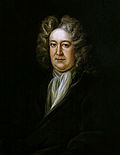| The Ambitious Stepmother | |
|---|---|
 James Middleton as Artaxerxes, 1795 | |
| Written by | Nicholas Rowe |
| Date premiered | December 1700 [1] |
| Place premiered | Lincoln's Inn Fields Theatre |
| Original language | English |
| Genre | Tragedy |
The Ambitious Stepmother [2] is a 1700 tragedy by the British writer Nicholas Rowe. It was his debut play. Rowe set his play in Biblical times, but it had strong subtexts of the contemporary questions about the British succession that led to the Act of Settlement in 1701. [3] At the court of Persia, Artemisa schemes against her stepson Artaxerses.
Contents
The original cast included John Verbruggen as Artaxerses, Barton Booth as Artaban, Thomas Betterton as Memnon, John Bowman as Magas, George Pack as Cleanthes, Elizabeth Barry as Artemisa, Elizabeth Bowman as Cleone and Anne Bracegirdle as Amestris.
The play was dedicated to Edward Villiers, the Right Honourable Earl of Jersey, Lord Chamberlain of His Majesty's Household. [4]
